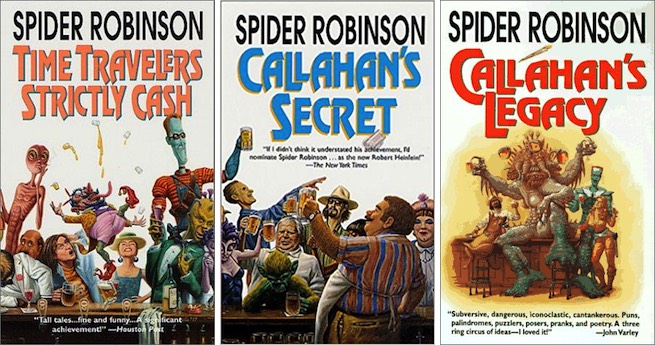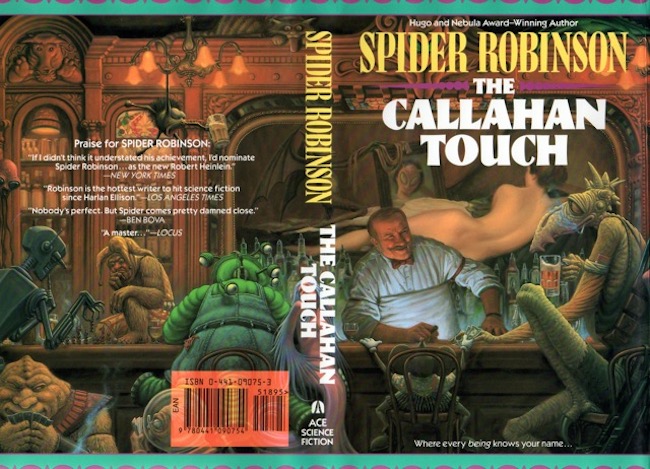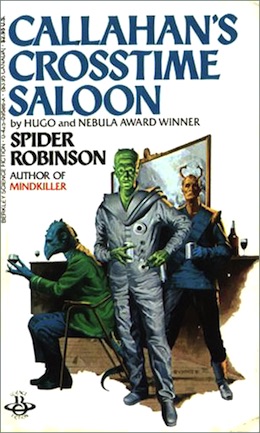In this bi-weekly series reviewing classic science fiction and fantasy books, Alan Brown looks at the front lines and frontiers of the field; books about soldiers and spacers, scientists and engineers, explorers and adventurers. Stories full of what Shakespeare used to refer to as “alarums and excursions”: battles, chases, clashes, and the stuff of excitement.
Not all bars are the same. Some cater to the elite, offering picturesque views and fancy cocktails. Some cater to the young, and are full of mirrors and flashing lights and pulsating music. Some cater to dockworkers and fishermen, looking to ease the pain of a hard work day with a stiff drink. Some will have a circle of musicians in the corner, lost in the music as they play their jigs and reels. And there are rumors that, in a nondescript corner of the suburban wilds of Long Island, there was once a magical bar called Callahan’s Place, where adventures were not just recounted—they were experienced. A bar where the unexpected was commonplace, the company was always good, the drinks were cheap, and most importantly, where the broken people of the world could gather and be made whole.
My father used to say that adventure was reading about another man’s problems in the comfort of your easy chair. I’m sure he was quoting someone, but he’s my dad, so he gets the credit. When I joined the Coast Guard, I found he had a point. I witnessed some amazing things, but those experiences, in addition to being exciting, were also accompanied by cold (to the point of hypothermia), injuries, mind-numbing boredom, confusion, nausea, fear, hunger, terrible coffee, and that excruciating pain of not being able to use the head until the end of a watch. I never wrote my experiences down for others to read, but found that they had transformed when I sat down, months and sometimes years later, in a bar with a drink in front of me, and started a tale with those old hallowed words, “This is no shit…” or the old reliable, “It was a dark and stormy night…” Whatever difficulties and discomfort I had experienced had faded in my memory, and all that was left was the excitement of the experience itself, distilled to its essence. An experience had become an adventure.
You might wonder why I chose to review a book about a bar in a column dedicated to the front lines and frontiers of SF adventure, but now you know. In my mind, there is no place more closely associated with adventure as a good bar with good company. And, in the case of a bar like Callahan’s Place, sometimes the adventure comes not just in tales, but in person.
About the Author

Spider Robinson (and as far as I can determine, that is his legal name) was born in New York City in 1948. He sold his first SF story, a Callahan story, to Ben Bova at Analog in 1972. Bova’s mentoring of Spider is yet another example of why he should be ranked among the best editors in the field. In 1975, Spider married dancer and choreographer Jeanne Robinson, with whom he co-authored the acclaimed Stardance trilogy. In addition to his fiction, he reviewed books for both Galaxy and Analog, and wrote a column for Canadian newspaper The Globe and Mail.
Spider earned the John W. Campbell Award for Best New Writer, two Hugo Awards in the novella category (one shared with Jeanne Robinson), one Hugo Award for a Short Story, and one Nebula Award for a novella (also shared with Jeanne Robinson). Spider is best known for the Callahan series, which grew to three short story collections, two related novels about Callahan’s wife, and four novels after that.
He wrote a number of other novels, primarily set in the present or near future, and nearly all set on Earth. His first novel, Telempath, was wildly inventive, with enough twists and turns to fuel an entire writing career, not just a single book. The Stardance series was an uplifting and positive view of the idea of human transcendence. Robinson was selected to complete an unfinished novel by Robert Heinlein, a book titled Variable Star, the only writer I know of to be honored with such an assignment. Spider’s most recent book is Very Hard Choices, a follow-up to the book Very Bad Deaths, in which the protagonists use telepathy to battle a sinister government conspiracy. The last few years have been difficult, as he has lost both his wife and daughter to cancer, and suffered a heart attack himself.
Spider is empathic, a talented musician, and generous with fans, something I know from personal experience. My father and I spent an evening with him and a small group of fans at a Con somewhere along the line, singing Beatles songs and telling jokes and stories. Spending time with Robinson gives you a good idea of what the fictional Callahan’s Place would be like. If you ever get the chance to hear him read his own work, do so, as he ranks with Neil Gaiman as one of the best storytellers around. Spider will be a Guest of Honor at the 76th World Science Fiction Convention in 2018, a well-deserved recognition.
The World of Callahan’s Place

Callahan’s Place was identified simply by a hand-lettered sign, lit by a spotlight. It was somewhere off Route 25A, Suffolk County, Long Island, New York. Mike Callahan, the proprietor, is a big, redheaded Irishman. Originally, the clientele was charged a dollar a drink, with fifty cents returned if they did not break their glass by throwing it into the fireplace after a toast. The place was brightly lit, and comfortable. Monday was Fill-More singalong night. Tuesday was Punday Night. Wednesday was Tall Tale Night. There were dart championships, sometimes dancing, and other diversions.
Our viewpoint character throughout the series is Jake Stonebender, who came to the bar after fixing his own brakes to save money, only to lose his wife and child when they failed. Jake is a guitarist, and generally holds his own in the pun and storytelling competitions. The denizens of Callahan’s Place are a diverse and colorful bunch. The house musician is Fast Eddie Costigan, a piano player with an outstanding memory for the American songbook. Doc Webster is an old-fashioned doctor who still carries his black bag and makes house calls, and is a force to be reckoned with during wordplay. Other regulars included Slippery Joe Maser, a man with two wives, and Noah Gonzalez, a member of the county bomb squad.
Over the years, we learned that Callahan had a wife, Lady Sally, who ran a brothel. Later on, Callahan moved on to other endeavors and Jake took over the bar, which became known as Mary’s Place. Eventually, the gang ended up relocating south to Key West, where we are told they continue to operate a drinking establishment, simply called “The Place,” to this day.
Callahan’s Crosstime Saloon

The book, the first of the series, is a collection of short stories. In “The Guy With the Eyes,” the first story to appear in Analog, a young recovering heroin addict, Tommy Jansen, comes into the bar and receives support and encouragement from the regulars. Another customer, a large man with penetrating eyes, is inspired by what he has seen and admits that he is a robot sent by an alien race to destroy the world. He doesn’t want to do it, but is constrained by his programming. The gang, with the help of some clever wordplay, find a way around the problem, saving the series from a rather premature end. Like many other Analog readers, I fondly remember reading that story, which was so different than anything I had come across before.
“The Time Traveler” is the story of Reverend Thomas Hauptman, who comes in on Punday Night to rob the place. He has spent a number of years imprisoned by revolutionaries, lost his wife and his faith in the process, and has given up all hope of ever fitting into society. Without employing an SF gimmick of any type, the story does an excellent job illustrating the impact the passage of time can have on people. Hauptman finds himself comforted at Callahan’s Place, and ends up taking a bartending job. When the story appeared in Analog, there were a few complaints that it wasn’t science-related enough, but by that time, Spider’s wit and the quality of his writing had won over the majority of the magazine’s readers.
“The Centipede’s Dilemma” presents the gang with a problem. What you do when a mean-tempered man with telekinetic powers wants to interfere with the Third Annual Darts Championship of the Universe?
“Two Heads are Better Than One” brings Jim MacDonald into the bar on Tall Tale Night, in excruciating pain. His brother Paul developed telepathic powers, and ended up in an institution, overwhelmed by what he experienced. Now Jim is developing those same powers, and doesn’t know how to cope. Not only does this true story beat everything else on Tall Tale Night, but the gang is able to help find a solution to the brothers’ dilemma.
“The Law of Conservation of Pain” brings a real time traveler into the bar. He is a man on a mission. One of the most powerful singers of his time (a few decades in the future) is a woman whose career was shaped by her pain after being viciously attacked by a dirty cop. The time traveler has come back to kill the corrupt officer before he can hurt her. His plan is disrupted when his brother also arrives from the future, intent on stopping him. Can they prevent a heinous attack by committing a crime themselves? And should they? What will result from their intervention? Would the artist still be the same without undergoing the same life experiences? This story gets to the emotional heart of the entire Callahan series, examining how pain shapes our lives, how to live with it, and how to mitigate it.
“Just Dessert” is a short-short which shows how the gang deals with a pair of practical jokers, finding a way to hoist them on their own petard.
In “A Voice is Heard in Ramah…” a woman walks into Callahan’s Place on Punday night, when the topic is science fiction. That wouldn’t be unusual in this day and age, but back in the last century, bars like Callahan’s were often all-male establishments. She tells a joke about Middle East conflict that seems destined to win the pun competition, but is reminded that her story doesn’t fit the night’s theme. Until she reminds them that her story is indeed a tale of “Zion’s friction,” one of the most egregious puns in a series full of them. But like many people who come to the bar, Rachel has a problem. She was born in 1741, and seems to be cursed to watch all her children die before they can have children themselves. While long-lived, she is not immortal, and she desperately wants to live on through a family. Once again, the gang puts their heads together to help someone in need.
“Unnatural Causes” brings yet another alien creature into the bar. It’s Halloween, so he doesn’t even need to wear a disguise. Having been monitoring Callahan’s Place, and hearing how the folks in the bar helped a Vietnam vet named Tony, he wants absolution for what he and his race have done…which turns out to be manipulating human history to create a population explosion that will allow the aliens to feed on humanity, using them as livestock. Spider does a pretty compelling and chilling job of convincing the reader that human history is just a bit too bizarre to have happened simply by chance. But the alien finds that absolution requires something from both parties involved. And once again, the Callahan gang are called upon to save the world.
The final story in the collection is “The Wonderful Conspiracy.” On a New Year’s Eve, a small group of regulars gather for some introspective conversation, and Jake discovers that this unique establishment is even more unique than he ever imagined.
Final Thoughts
I can’t recommend this collection enough. It has wit, whimsy, and passion; it stretches not only your mind, but your heart. I myself prefer the shorter Callahan works to the novels, because the setting lends itself so well to the short form, but every book in the series has its own merits, and it is always good to get back together with the old gang. I defy anyone to read these books without identifying with the characters, and wishing that you could join them to lift a pint, or whatever drink you might choose. Spider Robinson is a treasure, and you can give no better gift to a friend than sharing his work with them.
And now I turn the floor over to you. What is your favorite Callahan story? And feel free to discuss any of Spider’s work that you may have enjoyed.
And in honor of Spider and his career, in addition to discussion of his work, I would like to open the floor for jokes and puns. We can’t lift a pint to the man on the internet, but we can engage in wordplay. You can share a favorite joke from Spider’s work, or offer up something of your own. To start, I will offer a “That’s Amore” pun, a genre Spider played with in one of his works. You take the old standard, “When the moon hits your eye, like a big pizza pie, that’s amore,” and come up with a rhyming variation on the theme. So here’s one of mine: “When she studies past dark, for another high mark, that’s one more A.”
Alan Brown has been a science fiction fan for over five decades, especially fiction that deals with science, military matters, exploration and adventure.










